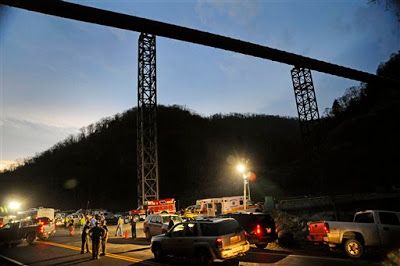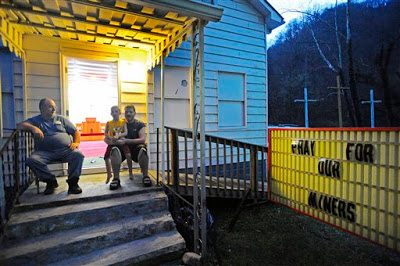What We Owe the Miners
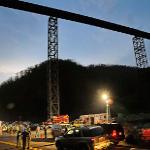 Life is hard in the coal country of West Virginia, harder than most of us can possibly imagine.
Life is hard in the coal country of West Virginia, harder than most of us can possibly imagine.
West Virginia State Police direct traffic at the entrance to Massey Energy's Upper Big Branch Coal Mine Monday, April 5, 2010 in Montcoal, W.Va. (AP Photo)
25 dead in West Virginia Mine Blast, Worst Since 1984
MONTCOAL, W.Va. (AP) - Rescue teams planned to search again for four workers missing in a coal mine where a massive explosion killed 25 in the worst U.S. mining disaster in more than two decades, though officials said Tuesday that the chances were slim that the miners survived.
Life is hard in the coal country of West Virginia, harder than most of us can possibly imagine. A long-time friend of mine is from the coal country, and his stories of life in that land are sobering to say the least. It is difficult to believe that poverty such as we have in the Appalachians exists in North America. The miners go down in the ground every day, year in year out, suffer black lung and risk their lives to bring us the fuel that provides an estimated 23% of our nation's energy. Most electricity (52% in 2000) in the country is generated from coal-fired power plants. Another way to look at: half the power that's running the lights and the computer you're looking at right this very moment is the result of the labors of men like those twenty-five souls who perished yesterday in a horrible accident in Montcoal, West Virginia. Why do we derive so much of our energy from a source that is so problematic? Why aren't we using more clean energy like wind, solar, and hydro? Why is only a mere 7.3% of our energy from renewable sources - mainly from hydroelectric dams?
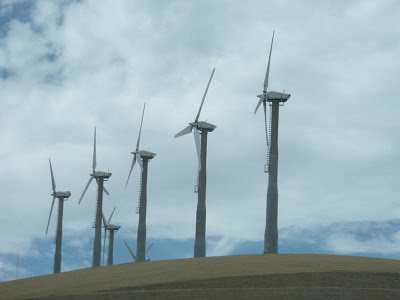 Let me tell you something - if it worked, we would use it. It costs a lot of money up front - money that comes from investors willing to take the risk - to get a mining operation going. If there was a more sure way of getting a return on those bucks from, say, the wind or the sun - we would have done it a hundred years ago. We do it, in fact, with hydroelectric - because it works. The problem is there are only so many geographic sites that are suitable for a dam to be placed to produce hydroelectric power.
Let me tell you something - if it worked, we would use it. It costs a lot of money up front - money that comes from investors willing to take the risk - to get a mining operation going. If there was a more sure way of getting a return on those bucks from, say, the wind or the sun - we would have done it a hundred years ago. We do it, in fact, with hydroelectric - because it works. The problem is there are only so many geographic sites that are suitable for a dam to be placed to produce hydroelectric power.
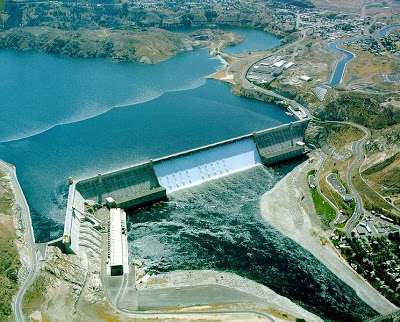 The Grand Coulee Dam on the Columbia River is the largest hydroelectric power-producing facility in the United States and the fifth largest producer of hydroelectricity in the world.
The Grand Coulee Dam on the Columbia River is the largest hydroelectric power-producing facility in the United States and the fifth largest producer of hydroelectricity in the world.
"But oh," you say, "the energy companies are robber barons, and they MAKE us use coal because they make money that way!" Sorry, does not compute. If there was a cheap, guaranteed way of getting money from the wind, the country would be festooned with windmills from sea to shining sea. Energy poor countries in the tropic - where there is plenty of sunshine - would have acres and acres of solar panels. The coal and oil companies were not able to stop the nuclear power industry - it took government and the environmental movement to put a damper on that relatively clean source of energy. 20% of the nation's total electric energy consumption comes from nuclear power plants, and if the government could manage itself properly, the cost of nuclear-generated electric power would almost be free. 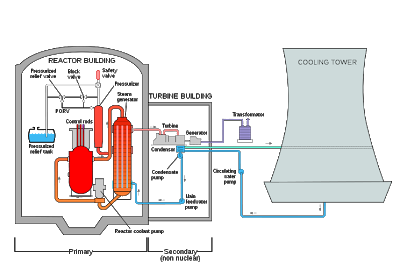 Schematic of a pressurized water nuclear power plant.
Schematic of a pressurized water nuclear power plant.
And so our lingering dependency on fossil fuels, and continuing human tragedy like what is playing out in Montcoal, West Virginia even now as I type . . . God rest their souls . . . pray for the miners and their families . . . and pray for a miracle that four missing West Virginia coal miners will be found alive . . . - Sean Linnane
Originally posted at STORMBRINGER.
